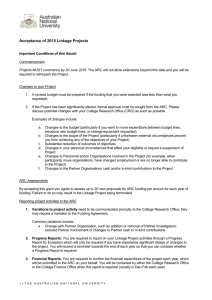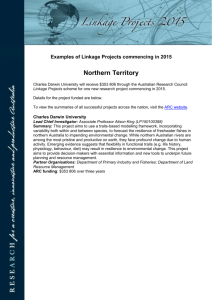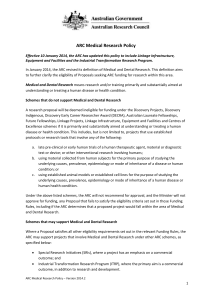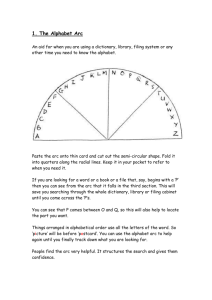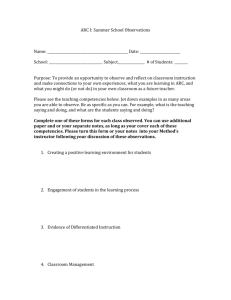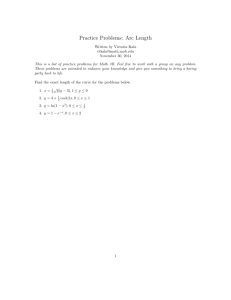ARC presentation to RUN meeting
advertisement
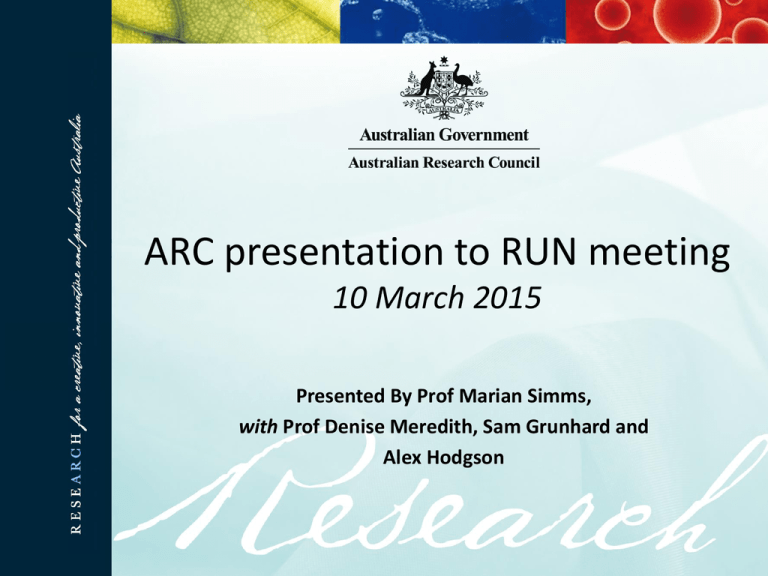
ARC presentation to RUN meeting 10 March 2015 Presented By Prof Marian Simms, with Prof Denise Meredith, Sam Grunhard and Alex Hodgson National Competitive Grants Program Discovery Projects Laureate Fellowships 5% Future Fellowships 16% Linkage Projects Centres of Excellence 7% DECRA 3% CoFunded & SRI Discovery Indigenous ITRP Discovery Projects 41% Linkage Projects 18% Five (5) year averages The Australian Research Council • The Australian Research Council (ARC) is a Commonwealth entity within The Department of Education and Training. • The ARC’s main responsibilities are: – providing funding for research through the National Competitive Grants Program (NCGP) – providing policy advice on research matters to Government – evaluating research quality in Australia through Excellence in Research for Australia (ERA) – and, together with the National Health and Medical Research Council (NHMRC), administer the Australian Research Integrity Committee (ARIC). 2014–15 Federal Budget (Approx. AU$415 billion) (Treasury omitted) Australian Government support for science, research and innovation 2014–15 ($9.2 b) Other R&D 1.95% CSIRO 8.11% Energy and the Environment 1.37% Rural 3.30% Other Health 0.63% DSTO 4.44% ARC 9.53% NHMRC 10.12% CRCs 1.63% Australian Government R&D 7.50% Higher Education R&D 0.47% Block Funding 21.19% Business Innovation 3.30% Business R&D 0.02% Industry R&D Tax Measures 26.44% ARC NCGP funding by University ($m) 2007–2013 RUN IRU ATN Go8 Unaligned ARC funding by institute 2010–2014 ARC NCGP funding by 2-Digit FoR (%) 2006–2014 100% Mathematical Sciences Physical Sciences Chemical Sciences 90% Earth Sciences Environmental Sciences 80% Biological Sciences Information and Computing Sciences 70% Agricultural and Veterinary Sciences Engineering 60% Technology Medical and Health Sciences 50% Built Environment and Design Education 40% Economics Commerce, Management, Tourism and Services 30% Studies in Human Society Psychology and Cognitive Sciences 20% Law and Legal Studies Studies in Creative Arts and Writing 10% Language, Communication and Culture 0% 2002 History and Archaeology 2003 2004 2005 2006 2007 2008 2009 2010 2011 2012 2013 2014 Philosophy and Religious Studies NCGP and Peer Review • Under larger schemes, such as Discovery Projects (DP) and the Discovery Early Career Researcher Award (DECRA), all five panels of the ARC College of Experts convene for selection meetings. In other schemes, such as Australian Laureate Fellowships and Linkage Infrastructure, Equipment and Facilities schemes, a single interdisciplinary Selection Advisory Committee (SAC) may be utilised. SAC members may be ARC College members and/or other eminent researchers. • The five panels are: Biological Sciences and Biotechnology (BSB), Engineering, Mathematics and Informatics (EMI), Humanities and Creative Arts (HCA), Physics, Chemistry and Earth Sciences (PCE), and Social Behavioural and Economic Sciences (SBE). Rejoinders • Where the ARC seeks external assessments, applicants are often given the opportunity to submit a Rejoinder • The Rejoinder process allows applicants to respond to assessment comments made by external assessors • Rejoinders are not viewed by external assessors but are considered by an ARC College of Experts Panel or SAC when deciding on the final recommendation for a Proposal • Timeframes for applicants are typically up to ten working days Selection Meeting • The Selection Meeting is the final face-to-face meeting of the panel of General Assessors and is the conclusion of the peer review process • The panels meet to consider which proposals to recommend to the ARC for funding, and recommended budgets for those proposals • All recommendations are given to the ARC CEO, who then makes recommendations to the Minister • All funding decisions are made by the Minister under the ARC Act NCGP Lifecycle Eligibility • ARC staff and Executive Directors assess eligibility etc., but do not decide whether proposals should be funded • All proposals are assessed against the selection criteria, and in accordance with the weightings for that scheme • Proposals are generally assigned to two College of Experts members and at least two external assessors • College of Experts meets to moderate judgments and to make final recommendations about fundable proposals and budgets • Under the ARC Act all recommendations are just that, and must be approved by the Minister ARC Assignment Information • The ARC has completely redesigned the way that potential assessors are matched to a proposal for assessment purposes • Multiple areas of the proposal are mined for a set of keywords and presented to the person completing the assignments as a word cloud ARC Assignment Information (2) • This information is then matched to information stored against a potential assessor’s profile and presented in a similar word cloud • The most appropriate person is then selected and assigned to the proposal to assess Research Opportunity • The ARC is committed to ensuring all eligible researchers have fair access to competitive funding through the National Competitive Grants Program. • The ARC considers that Research Opportunity comprises two separate elements: – Career experiences (relative to opportunity) – Career interruptions • The ARC ROPE Statement (released Feb 2014) is online at: http://www.arc.gov.au/applicants/rope_statement.htm Aims of the Discovery Program • Fund excellent, internationally competitive research by individuals and teams that will produce high quality outcomes • Build Australia’s research capacity through supporting and facilitating research training and career opportunities for excellent Australian and international researchers • Support research in priority areas that will deliver national benefits • Enhance research capacity and outcomes through support for international collaboration DP—Success and return rates 4500 70% 4000 60% 3500 50% 3000 2500 40% 2000 30% 1500 20% 1000 10% 500 0 0% 2008 2009 2010 2011 2012 2013 2014 2015 Ineligible Unsuccessful Successful Success rate % Return rate % DECRA—Success rate 2500 18% 16% 2000 14% 12% 1500 1000 10% proposals not funded 8% proposals funded 6% 4% 500 2% 0 0% 2012 2013 2014 2015 success rate % Future Fellowships—Success rate 1400 40% 1200 35% 30% 1000 25% 800 20% 600 15% 400 10% 200 5% 0 0% 2009 2010 2011 2012 2013 2014 proposals not funded proposals funded success rate % Discovery Indigenous—Success rate 35 70.0% 30 Number of Proposals 60.0% 25 50.0% 22 16 20 19 22 38.5% 40.0% 34.5% 31.3% Successful 31.3% Success rate 15 30.0% 10 5 20.0% 10 10 10 10 2012 2013 2014 2015 0 Unsuccessful 10.0% 0.0% Laureate Fellowship—Success rate 160 0.7 140 0.6 Number of Proposals 120 0.5 100 80 0.4 133 122 Successful 95 0.3 91 60 74 82 15.7% 15.5% 40 17.8% 15.2% 0.2 12.2% 10.1% Unsuccessful 0.1 20 15 15 17 17 17 16 2009 2010 2011 2012 2013 2014 0 0 Success rate Key funding features of schemes • Discovery Project and Discovery Indigenous schemes award project costs (travel, equipment, support staff, etc.) • Discovery Indigenous scheme also provides opportunities for Indigenous researchers to apply for a DAATSIA, DECRA primarily awards a salary for the awardee, with a small allocation of project costs • Laureate Fellowships awards a salary top-up plus funding for a team of postdoctoral and postgraduate researchers • Each scheme has different selection criteria, rules and funding limits, as each serves a different purpose Linkage Program • The ARC’s Linkage funding schemes aim to encourage and extend cooperative approaches to research and improve the use of research outcomes by strengthening links within Australia’s innovation system and with innovation systems internationally • Linkage promotes national and international research partnerships between researchers and business, industry, community organisations and other publicly funded research agencies • By supporting the development of partnerships, the ARC encourages the transfer of skills, knowledge and ideas as a basis for securing commercial and other benefits of research • The main Linkage Program schemes are: Linkage Projects; Linkage Infrastructure, Equipment and Facilities (LIEF); ARC Centres of Excellence; and Special Research Initiatives. General budget items • access to national and international research and infrastructure facilities • access to Workshop Services • expenditure on Field Research • expert services of a third party • equipment (and its maintenance) and consumables • personnel and higher degree by research stipends • publication and dissemination of Project outputs & outreach activity costs • specialised computer equipment and software • teaching relief for CIs (not for recipients of ARC Awards or Fellowships) • travel costs essential to the Project • web hosting and web development specific to the Project • workshops and conferences Discovery Projects • DP is the largest scheme, supporting excellent basic and applied research by individuals and teams • Success rate typically 20% to 22% in recent years, 18% for DP15 • Selection criteria (more detail on each in Funding Rules): - Investigator (40%) - Project Quality and Innovation (25%) - Feasibility and Benefit (20%) - Research Environment (15%) • Funding up to five years, up to $500,000 per year • No salaries for CIs/PIs Discovery Indigenous • Supports fundamental research and research training by Indigenous Australian researchers as individuals and as teams • Lead CI must be Indigenous • Selection criteria (more detail on each in Funding Rules): – Investigator (40%) – Project Quality and Innovation (35%) – Research Environment (15%) – Feasibility and Benefit (10%) • Funding up to three years, up to $500,000 per year • No salaries for CIs/PIs (though note DATSIAs) Discovery Early Career Researcher Award (DECRA) • • • • • • Support and advance promising early career researchers, and enable research and research training in high quality and supportive environments Highly competitive; 200 per round Eligibility: up to 5 years post-PhD (note ROPE) Selection criteria (more detail on each in Funding Rules): – Project Quality and Innovation (40%) – DECRA Candidate (35%) – Research Environment (15%) – Feasibility and Benefit (10%) Funding for up to three years DECRA salary plus up to $40,000 per year project costs Key changes to rules (1) • • New format: one set covering all schemes in the Program One section dedicated to the Discovery Program covering: – Level and Period of Funding – Budget Items Supported and Not Supported – Eligible Organisations – Limits on Projects and Proposals – Submission of proposals – Selection and approval process – Reporting requirements – Fundamental principles of conducting research Key changes to rules (2) • • • • • • Discovery Projects now available for five (5) years—though note criteria about cost-effectiveness and value for money No DORAs in DP15/DP16 Removal of restrictions on a number of budget items for all schemes (publication costs, web hosting, mobile phones, workshops) Increase in DIA $$ within DP to promote internationalisation Extension of career interruption time available in DECRA Harmonisation of cross-scheme eligibility rules for clarity and consistency More information • ARC staff are available to assist via email and phone • Huge amount of valuable information on the ARC website – Funding rules and Instructions to Applicants – FAQs – Additional pages on various policies – Detailed outcomes for all schemes for recent years, arranged by institution and by discipline (FoR code) Discussions / Questions

